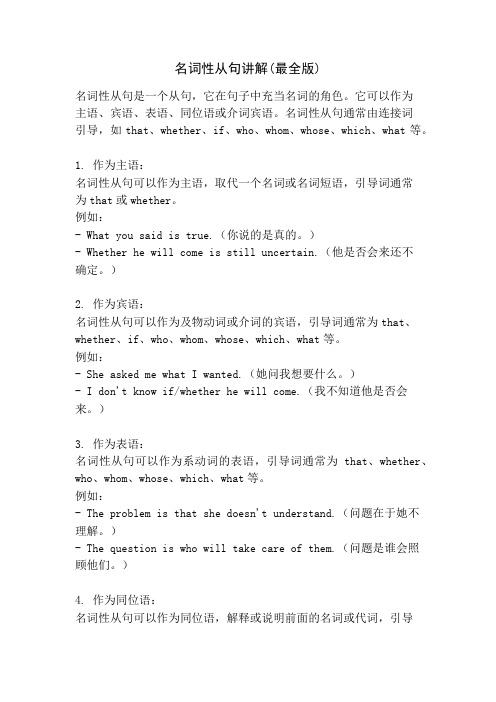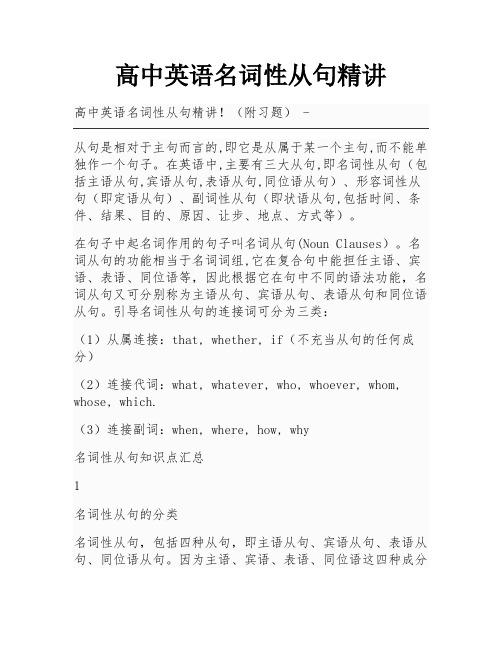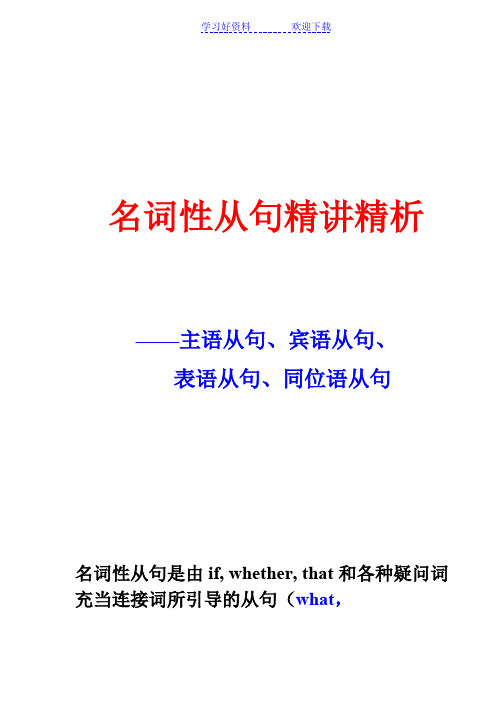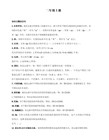名词性从句精讲
名词性从句讲解(最全版)

名词性从句讲解(最全版)名词性从句是一个从句,它在句子中充当名词的角色。
它可以作为主语、宾语、表语、同位语或介词宾语。
名词性从句通常由连接词引导,如that、whether、if、who、whom、whose、which、what等。
1. 作为主语:名词性从句可以作为主语,取代一个名词或名词短语,引导词通常为that或whether。
例如:- What you said is true.(你说的是真的。
)- Whether he will come is still uncertain.(他是否会来还不确定。
)2. 作为宾语:名词性从句可以作为及物动词或介词的宾语,引导词通常为that、whether、if、who、whom、whose、which、what等。
例如:- She asked me what I wanted.(她问我想要什么。
)- I don't know if/whether he will come.(我不知道他是否会来。
)3. 作为表语:名词性从句可以作为系动词的表语,引导词通常为that、whether、who、whom、whose、which、what等。
例如:- The problem is that she doesn't understand.(问题在于她不理解。
)- The question is who will take care of them.(问题是谁会照顾他们。
)4. 作为同位语:名词性从句可以作为同位语,解释或说明前面的名词或代词,引导词通常为that、whether、who、whom、whose、which、what等。
例如:- The fact that he lied surprised me.(他撒谎的事实让我感到惊讶。
)- His belief that she will succeed is unwavering.(他坚信她会成功。
英语 名词性从句精华版

1. 主语从句:从句在句中充当主语成分
1). That he will succeed is certain . 2) Whether he will go there is not known . 3) What he said is not true . 4) Where he hid the money is to be found out . 5) Whoever comes is welcome. 6) It’s certain that he will succeed . 7) How we can help the twins will be discussed at the meeting. 8)When they’ll start the project has not been decided yet.
3. 表语从句:从句在句中充当表语成分,一般放在连 系动词之后. 作用:对主语进行解释说明。
连接词:that / whether /as if /as though/because ( if 不引导 表语从句) 连接代词:who / whom / whose / which / what 连接副词:when / where / why / how / because
名词性从句 精讲
主语从句 宾语从句 表语从句 同位语从句 从句一律保持陈述语序。
名词性从句可以表示:事实和问题。
1.连接词有: that whether 和 lf 2.连接代词有:who whom whose which what 等 3.连接副词有:when where why how 等 另外 whatever whoever whichever等 也可 以引导主语和宾语两种从句。
高中名词性从句语法精讲详解

高中名词性从句语法详解名词性从句:宾主同表(宾从,主从,同从,表从)一、宾语从句宾语从句的类型(1)主语+谓语+宾语从句He said that he wouldn’t take part in the sports meeting.(2)主语+be+adj+宾语从句I’m sure that our team will win.☆只限于少数adj. sure, certain, afraid, confident, etc(3)主语+谓语+宾(表)语+介词+宾语从句(except, in that在于,因为)He is a good student except that he is a little careless.I like the city,but I like the country better in that I have more friends there1. 宾语从句的连接词1)连词that,只起连接作用,在从句中不作句子成分,也无词汇意义,在口语中常被省略★由that 引导的宾语从句在以下情况下不能省略:(1).在主+谓+it(形式宾语)+宾补+that从句(真正宾语) 的句型中:表喜欢、憎恶等心理活动的动词或词组后习惯上先跟形宾it:hate, love, enjoy, dislike, don’t mind, feel like, appreciate, rely/depend on, count on, see to, take, owe等We must make it clear that we mean what we say.We heard it that she would get married next month.(2).由and连接的两个由that引导的宾语从句中,第二个that 不省略.He told me (that) he would come and that he would come on time. (3) 从句前有插入语:He may tell you, for example, that she is interested in Chinese(4)从句主语是that时:He says that that is a useful book(5)当that从句是双宾语中的直接宾语时,that不可省。
名词性从句精讲

1)The news (that /which) he told is right.
(that引导的是定语从句,that在从句中作宾语)
2)The news that Tom would go abroad is right.
连接词位置
请用正确的连接词填空。 That 1____________ he finished writing the composition in such a short time surprised us all. 2.Whoever comes will be welcome. ____________ What 3.______ we need are good doctors. 4. ______ we must study for is a question of Whom great importance.
三.① 宾语从句中,用 It 作形式宾语
it 不仅可以作为形式主语,还可以作为 形式宾语而真正的宾语that 从句则放在句 尾,特别是在带复合宾语的句子中。 例如: We thought it was good news that the fog had finally gone.
We thought (that)the fog had finally gone was good news.
宾语从句:连接词在及物动词,介词, 间接宾语,形容词之后,且that可省略。
请用正确的连接词填空。 1.The problem is _____millions of people die of that illnesses caused by smoking. 2.The question remains _______we can whether win the people. 3.It looked _______it was going to snow. as if 4.This is ________I want to say. what where 5.His trouble is ________he can find a new job.
高考重难点名词性从句精讲

There is no scientific proof for the idea that time travel is possible.
5.Chinese students should be given more free time./ __________________________________________ The suggestion is welcomed by many people, especially ____________ kids in school. The suggestion that Chinese students should be given more free time is welcomed by many people, especially kids in school.
例:问题是我们什么时候得到答案。
例:问题不是谁去,而是谁留下来。
表语 The question is when we’ll get the answer.
The problem is not who will go but who will stay. 表语
4.同位语从句:
同位语从句起着进一步解释或说明它前面的名词的作用,
作用:对主语进行解释说明。
表语从句:在句中充当表语成分,一般放在连系动词之后 .
3. 表语从句:
在连系动词之后的句子叫做表语从句。
例:问题是谁能去那里。 表语 The question was who could go there. 例:那是他为什么迟到的原因。 That is why he was late. 表语
The fact that two thirds of all girls are on a diet worries their parents and teachers a lot. 2.The Queen of England was on a three-day visit in ______________________________________________ China./ We heard _________ the news last night. ______ We heard the news last night that the Queen of England was on a three-day visit in China.
高中英语语法-名词性从句精讲(共73张PPT)

Whoever wants the book may have it. I’ll do whatever I can to help him. Buy whichever is cheapest.
连接副词 when, where, how, why
when • When they will start is unknown yet. where • Where she has gone is a mystery. how • How this happened is not clear. why • Why he did that wasn’t quite unclear.
主语从句关联词 连词 that, whether 连接代词 what, who, whom, which 连接副词 when, where, how, why
连词 that, whether
只起连接作用 在从句中不充当任何句子成分
• That he will win is certain.
• It has been reported that sales of beef in China will increase.
宾语从句关联词 连词 that, whether; if 连接代词 what, who, whom, whose, which 连接副词 when, where, how, why
• I doubt _______ he will come soon. • I do not doubt _____ he will come soon. • Do you doubt _____ he will come soon?
• what surprised me was what he said.
高中英语名词性从句精讲

高中英语名词性从句精讲从句是相对于主句而言的,即它是从属于某一个主句,而不能单独作一个句子。
在英语中,主要有三大从句,即名词性从句(包括主语从句,宾语从句,表语从句,同位语从句)、形容词性从句(即定语从句)、副词性从句(即状语从句,包括时间、条件、结果、目的、原因、让步、地点、方式等)。
在句子中起名词作用的句子叫名词从句(Noun Clauses)。
名词从句的功能相当于名词词组,它在复合句中能担任主语、宾语、表语、同位语等,因此根据它在句中不同的语法功能,名词从句又可分别称为主语从句、宾语从句、表语从句和同位语从句。
引导名词性从句的连接词可分为三类:(1)从属连接:that, whether, if(不充当从句的任何成分)(2)连接代词:what, whatever, who, whoever, whom, whose, which.(3)连接副词:when, where, how, why名词性从句知识点汇总1名词性从句的分类名词性从句,包括四种从句,即主语从句、宾语从句、表语从句、同位语从句。
因为主语、宾语、表语、同位语这四种成分均可以由名词构成,所以这四种从句在主句中都充当了名词的作用,故将这四种从句统称为名词性从句。
如:1.That she will help me made us happy.(主语从句)2.I can understand what he said.(宾语从句)3.This is where I was born.(表语从句)4.The fact that a heavy earthquake happened made me crazy.(同位語从句)2名词性从句的连接词分类1.that(无含义,不充当成分)2.whether,if(有“是否”的含义,但不充当成分)3.连接代词:what, whatever, who, whoever, whom, whomever, whose, which, whichever.(在从句中做主语、宾语、表语和定语)连接副词:when, whenever, where, wherever, how, however, why (在从句中做状语)4. as if,as though,because(不充当成分,在名词性从句中只引导表语从句)3连接词 that 在名词性从句中可以省略的三种情况1.it 做形式主语,that引导主语从句时It is said (that) he has been studying abroad.据说他一直在国外学习。
英语名词性从句讲解【完整版】

2、I asked him if he could do me a favor .
If与whether的区别:
1、If不能引导放于句首的主语从句,而whether可以。 2、引导表语从句用whether,不用if。 3、引导同位语从句用whether,不用if。 4、whether可以引导从句作介词的宾语,不用if 。 5、whether or not 连在一起可以,但if不可以。而 “whether-----or not = if -----or not”
同位语从句:
定义:在复合句中充当同位语的句子。 同位语从句用来对其前面的抽象名词进行解释说明,被解释说明的词和 同位语在逻辑上是主表关系。 同位语常见名词:fact, suggestion, advice, idea, decision, news, thought, hope, belief, truth, doubt, promise, possibility, truth, warning, message, reason, report, question,explanation, wish, problem等。 常见的连接词:that, whether, what, who, how, when, where等。 用法: The thought that I want to buy my mother a birthday gift makes me excited.that 引导的同位语从句,解释说明 thought,从句不缺成 分 There is some doubt whether he will come. whether 引导同位语从句,if 不能引导同位语从句 we haven’t made the decision where we are going to spend our vacation. 有时同位语从句可以不紧跟解释说明的名词后面。 The news is surprising that he won the match.
名词性从句精讲

名词性从句精讲名词性从句在复合句中起名词作用的从句叫名词从句(Noun Clauses)。
名词从句的功能相当于名词词组, 它在复合句中能担任主语、宾语、表语、同位语等,因此根据它在句中不同的语法功能,名词从句又包括:主语从句、宾语从句、表语从句和同位语从句。
名词性从句中一律用陈述语序。
辨别下列名词性从句的类别:1.How the book will sell depends on its author.2.John said that he was leaving for London on Wednesday.3.The fact is that he has not been seen recently.4.The fact that he has not been seen recently disturbs everyone in his office.5.He will talk to us about what he saw in England.6.It is impossible that I go and attend the meeting.引导名词性从句的连词:1. 连接词:that (无词义,在句中不充当任何成分)if / whether (有词义“是否”,但不充当任何成分)2. 连接代词:who, whom, whose, what, which,(有词义,在句中充当主语、表语、宾语或定语)3.连接副词:when, where, why, how, (有词义,在句中充当状语)一.主语从句主语从句是在复合句中充当主语的从句,通常放在主句谓语动词之前或由形式主语it代替,而从句本身放在句子末尾。
1.主语从句位于主句谓语动词之前。
What matters most in learning English is enough practice.Where we shall have the meeting makes no difference.Whether the sports meeting will be held is not certain now.2.it 作形式主语代替主语从句,而真正的主语从句位于句末。
名词性从句精讲精析

名词性从句精讲精析——主语从句、宾语从句、表语从句、同位语从句名词性从句是由if, whether, that 和各种疑问词充当连接词所引导的从句(what,which,who,whose;when,where,how,wh y等),其功能同名词一样。
一.主语从句主语从句是在复合句中充当主语的从句,通常放在主句谓语动词之前或由形式主语it代替,而本身放在句子末尾。
1. It 作形式主语和it引导强调句的比较It 作形式主语代替主语从句,主要是为了平衡句子结构,主语从句的连接词没有变化。
而it引导的强调句则是对句子某一部分进行强调,无论强调的是什么成分,都可用连词that。
被强调部分指人是也可用who/whom。
例如:It is a pity that you didn’t go to see the film.It doesn’t interest me whether you succedor not.It is in the morning that the murder took place.It is John that/who broke the window.2. 用it 作形式主语的结构(1) It is +名词+从句It is a fact that…事实是…It is an honor that…非常荣幸It is common knowledge that…是常识(2) It is +形容词+从句It is natural that…很自然…It is strange that…奇怪的是…It is obvious that…明显的是…It is important that…重要的是…It is necessary that…必要的是…(3) It is +不及物动词+从句It seems that…似乎…It happened that…碰巧…It appears that…好象/看来…(4) It is+过去分词+从句It is reported that…据报道…It’s said that…据说…It’s believed that…人们相信…It’s hoped that…人们希望…It’s thought that…人们认为…It’s announced that…据宣布…It has been proved that…已证实…3. 主语从句不可位于句首的五种情况(1) if 引导的主语从句不可居于复合句句首。
英语名词性从句重难点精讲

▲注意辨别it作形式主语与it引导的强调句型的差异。如果把句中的it is/ was ... that/ who ...去掉,剩余部分仍能组成一个意义和结构均完整的句子,则原句是强调句型。
It was last summer that he graduated from the college.(→He graduated from the college last summer.) (强调句型)
It is strange that he didn’t come to school.
▲需要注意的是,当 what作“……的东西”讲引导主语从句时,一般不用it作形式主语。whatever, whoever, whichever引导的主语从句一般不用it作形式主语。
(×)It is more experience what he needs. ( 应说:What he needs is more experience.)
▲what指无限定范围的选择。若已限定了范围,则应用which。
That is what he chose.
Which team has won the game is not known yet.
▲what (ever),whoever, whichever 等是双重关系代词,它既起先行词的作用,又起关系代词的作用,此时不可在这些词前加that, all或在这些词后再加关系代词。
(×)All what she said is true. (可说All that she said is true. 或 What she said is true)
(×) Whatever that is worth doing should be done well. (应去掉that)
名词性从句专题讲解

强调信息
通过将信息放在名词性从句中, 可以强调该信息的重要性。
名词性从句在写作中的注意事项
避免冗长和复杂的句子结构
使用名词性从句时,应避免写出冗长和复杂的句子结构,以免使 读者感到困惑。
注意连接词的使用
在连接两个句子时,应使用适当的连接词来引导名词性从句。
注意语序
在某些情况下,使用名词性从句可能会改变原有的语序,需要特别 注意。
对名词作进一步的解 释或说明的名词性从 句,如"The news that the company is closing is sad."
如何使用名词性从句使文章更流畅
连接句子
使用名词性从句可以连接两个或 多个句子,使文章更加连贯和流
畅。
表达复杂概念
名词性从句可以用来表达复杂的 概念或关系,使读者更容易理解。
过去时态
表示过去发生或存在的动作或状态。在名词性从句中,常用一般过去时表示过去的事实、 观点、条件等。例如:He said that he was sorry。(他说他很抱歉。)
将来时态
表示将来发生或存在的动作或状态。在名词性从句中,常用一般将来时表示将来的事实、 观点、条件等。例如:I will go if you will come。(如果你来,我就去。)
语态
主动语态
表示主语执行的动作。在名词性从句中,常用主动语态 表示主语执行的动作或状态。例如:She said that she would go。(她说她要去。)
被动语态
表示主语承受的动作。在名词性从句中,常用被动语态 表示主语承受的动作或状态。例如:It was known that he had been fired。(大家都知道他被解雇了。)
名词性从句全面讲解

名词性从句全面讲解名词性从句是英语中的一种从属从句,它在句中充当名词的功能。
名词性从句可以在句子中作主语、宾语、表语和同位语等,并且可以由不同的引导词引导。
本文将全面讲解名词性从句的基本概念、用法及常见的引导词。
一、名词性从句的概念名词性从句是由一个词或一个词组引导的从句,它在句子中充当名词的角色。
名词性从句通常出现在复杂的句子中,起到连接主句和从句的作用。
名词性从句的引导词有很多种类,常见的有:that, whether, if, what, which, who, whom, whose, when, where, why等。
二、名词性从句的用法名词性从句可以在句子中作不同的成分,下面分别介绍其主要用法。
1. 名词性从句作主语名词性从句可以作为主语来引导句子,常用的引导词有:- That: That he is innocent surprises me.(他是无辜的让我吃惊。
)- Whether/If: Whether he will come or not is uncertain.(他是否会来还不确定。
)- What: What you said is true.(你说的是真的。
)2. 名词性从句作宾语名词性从句可以作为宾语来引导句子,常用的引导词有:- That: I know that he is a doctor.(我知道他是个医生。
)- Whether/If: I wonder whether/if it will rain tomorrow.(我想知道明天是否会下雨。
)- What: I don't understand what he is saying.(我不明白他在说什么。
)3. 名词性从句作表语名词性从句可以作为表语来引导句子,常用的引导词有:- That: The truth is that she is not happy.(事实是她不幸福。
)- Whether/If: The question is whether/if we should go or not.(问题是我们是否应该去。
名词性从句精讲

名词性从句精讲一、概述:起名词作用的从句叫名词性从句。
它和名词一样,在句中可充当主语,表语,宾语和同位语。
名词从句包括主语从句,表语从句,宾语从句和同位语从句。
名词性从句中的连接词有连词that / whether / as if,连接代词what / who/ which / whose / whatever / whoever / whomever / whichever,连接副词where / when / why / how / wherever / whenever。
(1)that的用法。
①主语从句、表语从句、同位语从句中用that但不能省略。
如:That they are good at English is known to us all.The problem is that we don’t have enough money.She expressed the hope that they would come to China one day.②宾语从句中的连接词that有时可省有时又不可省,在以下几种情况中that不能省略:(A)当that从句和主句谓语动词之间有插入词语或者从句主语之间有插入语时,that不可省略;(B)当that 从句与另一名词性从句并列作宾语时,that不能省,否则成带并列句了的从句了(一般是and连接)(C)当that作介词宾语时,that不可省掉。
(D)如果宾语从句本身含有主从复合句时,that一般不宜省。
(E)当主、从句之间有时间等状语修饰时,that不宜省略,否则会产生歧义。
(F)宾语从句提前时,that不宜省略。
(G)简单回答中的宾语从句,that不宜省略。
(H)当it作形式宾语代替that引导的宾语从句时,一般保留that为好。
Everyone knew what happened and that she was worried.The reason lies in that she works harder than the others do.③that从句作主语和宾语时,可以用it 来替换成以下几种结构表达。
名词性从句精讲精(主语从句和表语从句)

名词性从句精讲精练(一)名词性从句相当于名词,可分别作主句的主语、表语、宾语和同位语。
因此,名词性从句分为主语从句、表语从句、宾语从句和同位从句。
一、引导名词性从句的连接词1、连词:that(无词义), if, whether是否, as if好像:不充当从句成分, 只起连接作用。
2、连接代词:who, whose, whom, what, which:有词义,在从句中作主语、表语、宾语、或定语。
3.连接副词:when, where, why, how:有词义,在从句中作作状语。
若表示强调用:whoever, whatever, whichever, whenever, wherever 二、语序连接代词与连接副词在句中不再是疑问句,因而从句中谓语不用疑问式,即用陈述语序。
※1.根据句义,如果连接代词,连接副词和if、whether、as if都用不上时,才用that作连接词(that本身无任何含义)。
2.在主语从句、表语从句和同位从句中不用if引导;在主语从句和同位从句中引导词that不可省略,在表语从句中that有时可省略; 在宾语从句中可用if引导,that可以省略。
(一)主语从句在复合句作主语eg. 1. That he’ll come to the party makes us happy.2. Whether he’ll come is still uncertain.3. Who killed the old man is/remains a question.4. when they’ll start has not been decided yet.一般情况下,主语从句放在句首,此时主句谓语动词用单三形式。
但有时主语从句太长时,会有“头重脚轻”之感,因此常用it作形式主语,而把主语从句放到句子后面,此类句型有:1. It’s +adj/n+ that从eg. That you didn’t see the film last night is a pity.It’s a pity that you didn’t see the film last night.2. It’s said/reported+ that从eg. It’s said that three men were killed in the accident.3. It seems/happens(碰巧)+ that从eg. It seems strange that you don’t like money.(二)表语从句在复合句中作表语,位于系动词之后表语从句和主语指同一内容,它对主语进行解释说明,使主语的内容具体化。
(完整版)高中英语名词性从句讲解

适用文档名词性从句解说在复合句中起名作用的从句叫做名性从句。
它包含主从句、从句、表从句和同位从句。
名性从句是中学段的一个重要法目,在年的高考取几乎都波及到,而且每年的命各有化。
解析届高考名性从句考的焦点主要有以下六个方面1.考名性从句的序2.考引 that与 what 的区3.考 it 在名性从句中作形式主或形式的用法4.考 whether 与 if 的区5.考名性从句中的疑+ever 引的名性从句与no matter+ 疑引的状从句的区6.考名性从句的虚气法重点解析一、名性从句主从句、表从句、从句、同位从句,在整个句子中所起的作用,相当于一个名。
所以,四种从句通称名性从句。
引名性从句的接可分三:接: that, whether, if(不充任从句的任何成分)接代: what, whatever, who, whoever, whom, whose, which.接副: when, where, how, why1.主从句作句子主的从句叫主从句。
主从句往常由附属that ,whether ,if和接代what ,who,which ,whatever , whoever 以及接副 how, when, where, why 等引。
that 在句中无,只起接作用;接代和接副在句中既保存自己的疑含、又起接作用,在从句中充任从句的成分。
比如:What he wants to tell us is not clear.他要跟我什么,不清楚。
It is known to us how he became a writer.我都知道他是如何成一名作家的。
Where the English evening will be held has not yet been announced.英晚会将在哪里行,没有宣告。
有防止句子重脚,常用形式主it取代主从句作形式主放于句首,而把主从句置于句末。
主从句后的一般用数形式。
- 1、下载文档前请自行甄别文档内容的完整性,平台不提供额外的编辑、内容补充、找答案等附加服务。
- 2、"仅部分预览"的文档,不可在线预览部分如存在完整性等问题,可反馈申请退款(可完整预览的文档不适用该条件!)。
- 3、如文档侵犯您的权益,请联系客服反馈,我们会尽快为您处理(人工客服工作时间:9:00-18:30)。
名词性从句精讲来源:普特英语在复合句中起名词作用的从句叫名词性从句,包括作主语从句、表语从句、宾语从句和同位语从句。
(1)主语从句就是在复合句中作主语的从句。
主语从句常用that, whether, who, whom, whose, what, which, when, where, how, why, whatever, whoever等引导。
如:Whether he will be able to come remains a question. 他是否来还是问题。
That China is a great socialist country is well known. 众所周知,中国是一个伟大的社会主义国家。
注:为避免头重脚轻,使句子平衡,常用it作形式主语,而将主语从句后置。
如上述第二例常说成:It is well known that China is a great socialist country.但是,由连接代词what, whatever, whoever等引导的主语从句一般不能用形式主语。
如:What he found surprised me greatly. 他的发现使我非常吃惊。
Whoever is finished may rest. 凡是做完工的人都可以休息。
(2)表语从句就是在连系动词之后作表语的从句。
引导表语从句的连接除与引导主语从句的连接词外,还有as if,as though。
如:The question is whether he is able to do it alone. 问题是他能否单独做这件事。
It looks as if (though) it is going to snow. 天好像要下雪似的。
注意:要区分以下句式:1. that’s why+结果;that’s because+原因。
2. the reason why /for…is that…He is absent. That’s because he is ill. 他缺席,这是因为他生病了。
He is ill. That’s why he is absent. 他病了,这就是他缺席的原因。
The reason why he is absent is that he is ill. 他缺席的原因是他生病了。
(3)宾语从句就是在复合句中作宾语的从句。
引导这宾语从句的连接词与引导主语从句的连接词基本相同。
如:They didn’t say which they wanted. 他们没有说他们想要哪一个。
I am sure (that) no harm will ever come to you. 我肯定你永远不会受伤害。
I was surprised at what has happened.我对发生的事感到惊讶。
注意:当think, believe, suppose等的疑问式后面跟连接代词或连接副词引导的宾语从句时,习惯上将这些连接词置于句首,即“连接代/副词+do you think /believe /expect+宾语从句的其余部分?”如:Who do you think is the best player this year? 你认为今年谁是最佳运动员?What do you suppose you will do after school? 你想放学后干什么?(4)同位语从句就是在句中作同位语的从句。
它通常有放在thought, idea, news, word(=news), plan, doubt, question, fact, suggestion, belief等抽象名词的后面,说明这些词的具体内容或含义。
同位语从句大多由that引导,也可由whether, how, when, where, why等引导,但不能由which引导。
如:The idea that the earth is round is not a new one. “地球是圆的”这种观点并不新鲜。
He must answer the question whether he agrees to it or not. 他必须回答他是否同意此事这们一问题。
I have no idea when he will set out. 我不知他什么时候出发。
注:有时,同位语从句并不紧跟在它所说明的词的后面。
如:The whole truth came out at last that he was a wolf in sheep’s clothing. 真相终于大白了,他原来是一只披羊皮的狼。
注意1 语序问题不管什么词引导,从句的语序始终用陈述语序。
如:(1)He asked how he could find his courage. 他问道他如何才能找到他的勇气。
(2)The question is why there is little rain here. 问题是这里为什么雨水少。
注意2 连接词的选用问题A.that,whether,if,as if(限用于表语从句)都不作句子的任何成分。
因此,它们所引导的句子结构必须完整。
that 一般用于确定的语气中,引导宾语从句时,口语中的that可省略,而其他情况中的that一般不可省;而whether,if一般用于不确定的语句中。
如:(1)That he learnt English before is certain. 他学过英语是肯定的。
(2)I don’t know whether / if he will come. 我不知道他是否会来。
(3)He looks as if he knows the answer. 看起来他好像知道答案。
B.whether和if1)whether可用于任何名词性从句中,而一般只能用于宾语从句中。
如果if引导主语从句时,只能放在句中,而不能置于句首。
如:(1)Whether he will come or not doesn’t matter. —It doesn’t matter whether he will come or not. 他来还是不来都没关系。
(2)Do you know if / whether his words are true. 你知道他的话是否真实吗?2)whether可与or not连用,而if则不可以。
如(1)I’m not sure whether / if he can overcome the difficulties. 我没有把握他能否克服这些困难。
(2)The radio didn’t say whether it would rain or not tomorrow. 收音机并没有报道明天是否下雨。
3)若用if会产生歧义时,则用whether。
(1)Let me know whether he will come. 告诉我他是否会来。
(2)Let me know if he will come. 可理解为:告诉我他是否会来。
也可理解为:如果他愿意来,就告诉我一声。
4)whether可与不定式连用,而if不可以。
Have you decided whether to go there tomorrow? 明天是否去那儿,你决定了吗?(句子中的whether不能用if替换)5)whether引导的从句可作某些介词及动词discuss的宾语,而if则不可以。
如:(1)They are talking about whether they will take part in the strike. 他们在谈论他们是否要参加这次罢工。
(2)They are discussing whether they can employ the new way. 他们在讨论他们是否可以采用这种新的方法。
(以上两个句子中的whether 不能用if替换)6)宾语从句若为否定句,连接词则用if 而不用whether。
如:Do you know if he hasn’t been to Washington? 你知道他是否没有去过华盛顿吗?此句子中的If不能用whether替换。
一、词序问题名词性从句总是用陈述句词序,则不能使用疑问句词序,尤其是当名词性从句由“疑问词”引导时,不能受疑问句的影响而误用疑问句词序:误:I didn’t know where did he live.正:I didn’t know where he lived. 我不知道他住哪儿。
误:Who will he marry remains unknown.正:Who he will marry remains unknown. 他同谁结婚还不知道。
二、时态问题由于由when引导的时间状语从句和以if引导的条件状语从句要用现在时表示将来意义,而不能直接使用将来时态,所以许多同学容易受此影响在when和if引导名词性从句时也用现在时表示将来意义。
请看几题:(1) I don’t know if he ________ or not tomorrow.A. comeB. comesC. will comeD. is coming此题答案选C,句中if引导的不是条件状语从句(if≠如果),而是宾语从句(if=是否),句意为“我不知道明天他是否会来。
”(2) I don’t know if she ________, but if she ________ I will let you know.A. comes, comesB. will come, will comeC. comes, will comeD. will come, comes答案选D,第一个if 引导的是宾语从句,第二个if 引导的是条件状语从句。
(3) “When he _____ is not known yet.”“But when he ____, he will be warmly welcomed.”A. comes, comesB. will come, will comeC. comes, will comeD. will come, comes答案选D,第一个when 引导的是主语从句,第二个when引导的是时间状语从句。
另外,当主句为过去时态时,宾语从句通常要用过去的某种时态与之呼应(表客观真理时除外):The teacher told us that he knew everything. 老师告诉我们他知道一切。
The teacher told us that light travels faster than sound. 老师告诉我们光比声音传播得快。
